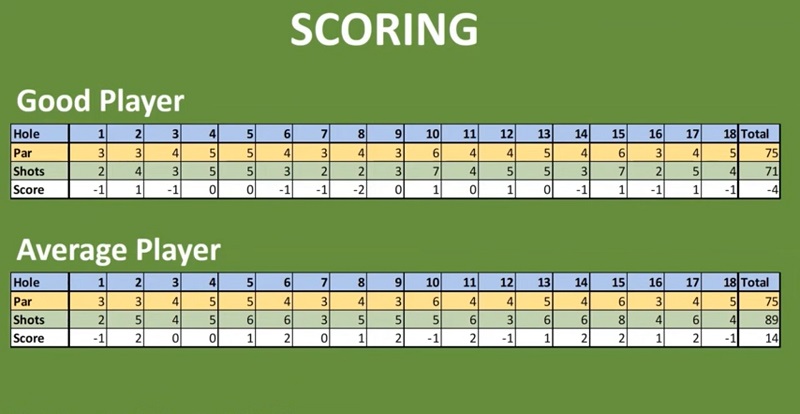Are you an aspiring golfer looking to break into the sport? Or perhaps a seasoned player who wants to improve their skills? Knowing what makes for a good score in golf is essential.
In this blog post, we’ll take an in-depth look at exactly what constitutes a good score in golf and how it scales depending on whether you’re playing 18 holes or 9 holes of the game. Read on and discover the basics of scoring your best game possible!
What Is A Good Score In Golf?
A good score in golf depends on many factors such as the course being played, its difficulty level, and the player’s skill level. Generally speaking, a score of par or lower is considered a good score by most standards. Par for an average 18-hole golf course is usually between 70 and 72 strokes, so anything under that is considered good. Of course, a professional golfer would likely have much lower scores than an average player.
What Are The Factors That Affect A Good Score?

Golf can be a challenging sport, with scores fluctuating from day to day. What constitutes a good score in Golf depends on various factors, including course difficulty, weather conditions, and the individual golfer’s ability. While some golfers may be content with breaking 90, others strive for shooting par or even better.
- Skill level: A player’s skill level is a major factor determining their score. Golf is a difficult sport that requires a lot of practice and skill development to become proficient.
- Course difficulty: The difficulty of the course can also affect a player’s score. Factors such as length, layout, and green speed can all make a course more challenging and impact the score.
- Weather conditions: Weather conditions such as wind, rain, and humidity can impact a player’s score. For example, playing in strong winds can make it harder to control the ball and hit accurate shots.
- Mental game: Golf is a mentally demanding sport, and a player’s mental state can greatly impact their score. Factors such as confidence, focus, and the ability to manage stress and pressure can all affect a player’s performance on the course.
- Equipment: Having the right equipment can also impact a player’s score. Golf clubs that are suited to a player’s swing can help them hit more accurate shots, while high-quality golf balls can provide better control and distance.
- Course management: The decisions a player makes on the course can also affect their score. For example, knowing when to take risks and when to play them safely can impact a player’s score.
What Is A Good Score In Golf 18 Holes?
While every golfer has their own goals and aspirations, many wonder what constitutes a good score in golf, regardless of their skill level or gender.
For beginners, a good score may be simply completing a round of 18 holes without losing too many balls or getting frustrated. As they improve their skills, a good score may break 100 for men or 110 for women. Amateur golfers who have been playing for a while may aim for scores in the mid-80s or low-90s, while highly skilled amateur golfers may aim for scores in the 70s.
Professional golfers, on the other hand, have much lower scores due to their advanced skill level and experience. A score of around 72 (even par) or lower is considered good for professional golfers playing on a regulation 18-hole course. For example, the average score on the PGA Tour is around 71, while the average score on the LPGA Tour is around 73.
.
What Is A Good Score In Golf 9 Holes?
For beginners, a good score in golf 9 holes is anything under 54 strokes. This range allows for some mistakes but still gives an indication that the golfer is beginning to understand how to play the game. The more experienced a golfer becomes, the better their score should be, with the expectation that they will break 80.
For amateurs, a good score in golf 9 holes is anything below 45 for an 18-hole round. This range shows that the golfer has some experience and knows how to play the game well; however, there is still room for improvement.
For professionals, a good score in 9 holes of golf is usually anything below par (36). This level of play indicates that the golfer has mastered the game and can make consistent shots with a high degree of accuracy.
What Is The Average Golf Score?
The average golf score can vary depending on various factors, including skill level, age, and the difficulty of the course. According to data from the National Golf Foundation, the average 18-hole score for male amateur golfers is around 97, while the average 18-hole score for female amateur golfers is around 112. For beginner golfers, scores may be higher as they are still learning the basics of the game.
Professional golfers, on the other hand, typically have much lower scores due to their advanced skill level and experience. For example, the average score on the PGA Tour is around 71, while the average score on the LPGA Tour is around 73.
It’s important to remember that these are just averages and that individual scores can vary widely based on the factors mentioned earlier and other factors such as weather conditions and mental state. Regardless of skill level, golfers are encouraged to improve their scores and set personal goals rather than compare themselves to others.
What Is A Bad Score In Golf?
A “bad” score is subjective and can vary depending on a golfer’s skill level and the difficulty of the course. However, in general, a bad score in golf is one that significantly exceeds the expected or average score for a player of that skill level.
For beginner golfers, a score of 100 or more for 18 holes might be considered a bad score. For amateur golfers, a score of 90 or above for 18 holes could be considered bad. For professional golfers, a score of 80 or above for 18 holes might be considered a bad score.
It’s important to keep in mind that golf is a challenging sport, and every golfer has a unique level of skill and experience. Rather than focusing on the score, it’s important to focus on improving your skills and setting personal goals to track your progress. With practice and dedication, golfers can improve their scores and enjoy the game even more.
Strategies To Improve Golf Scores

Improving your golf game and reaching a good score requires commitment, practice, and the right equipment. Tips to help you reach a good score include:
- Practice consistently: Consistent practice is key to improving your golf game. Spend time practicing different aspects of your game, including your swing, putting, chipping, and pitching.
- Analyze your game: Keep track of your scores and analyze your game to identify areas that need improvement. Focus on improving your weaknesses while maintaining your strengths.
- Develop a pre-shot routine: A consistent pre-shot routine can help you stay focused and relaxed on the course, leading to more consistent shots.
- Manage your emotions: Golf can be a mentally challenging sport, and managing your emotions is key to performing well. Stay positive and focused, and don’t let frustration or anger affect your game.
- Choose the right equipment: Make sure you have the right clubs and other equipment for your game. Consider getting custom-fitted clubs to ensure that your equipment is optimized for your swing.
- Play with better golfers: Playing with golfers who are better than you can help you improve your game by learning from their strategies and techniques.
- Take lessons: Working with a golf instructor can help you identify areas for improvement and develop a plan to reach your goals
Tips For Beginners Who Want To Start Playing Golf
Starting a golfing career can be daunting, particularly for those just starting. However, with some dedication and the right tips, anyone can improve their game and reach a good score. Here are some tips to help beginners get started in Golf:
Learn the Basics: Before hitting the golf course, it is important to learn the fundamentals of the game, such as the rules, proper etiquette, and how to swing a golf club. Consider taking a lesson from a professional instructor if you are starting.
Find an Appropriate Course: Playing on a course that is too difficult or easy can lead to frustration and bad scores. As a beginner, look for a course designed for beginners or manageable.
Use Proper Equipment: Ensure you have the right clubs and equipment before playing. Beginners should consider renting clubs from their local golf club, as this will help ensure they have the correct set of clubs for their skill level.
Take Lessons: Taking lessons from a professional instructor can help you better understand the game, improve your swing, and develop your skills faster.
Practice: The key to success in Golf is practice. Make sure to spend time on the driving range and putting green before you hit the course. This will help you become familiar with the clubs and develop a better swing.
Conclusion
Achieving a good score in golf requires hard work and dedication. It requires honing the important skills of good form, quickness, athletic ability, strength, and endurance to perfect your game. However, a good score in golf isn’t something that is set in stone; different courses can have varying levels of difficulty depending on the location.
Although there are standard 18-hole par’s and 9-hole par’s, working to better your own score can also be incredibly rewarding for any golfer. Ultimately, practice makes perfect and will help you reach new heights when scoring well on the course. Take time to work on your swing and read up on strategies from experienced players to improve your overall game so you can enjoy your time out on the course more than ever!
FAQs
What Is The Most Difficult Hole In Golf?
The most difficult hole in golf can depend on various factors, such as the course design and one’s personal skill level. Generally speaking, a course’s par 3 holes can often be considered the most difficult because they require precise accuracy. Additionally, par 4 and 5 holes with water hazards, tight fairway landings, and well-guarded greens can also demand a great deal of skill and precision. Ultimately, the difficulty of any hole in golf can be subjective and greatly depend on the individual.
What Is A Good Score On A Par 3?
A good score on a par 3 depends largely on skill level. For the average golfer, shooting par or below is considered an excellent score. Par 3s can be especially difficult due to their small green size, so anything under par is an impressive feat. For more advanced or professional golfers, shooting birdie or even better on a par 3 is considered a good score. Overall, the difficulty of any hole in golf can be subjective and greatly depend on the individual.
Is 80 A Good Golf Score?
A score of 80 is considered a very good score in golf, especially for amateur golfers. For many amateur golfers, breaking 80 is a significant achievement and a sign of improvement in their game. For professional golfers, a score of 80 would typically be considered an average or slightly below-average score, depending on the difficulty of the course and the conditions.
Is 76 A Good Golf Score?
A score of 76 is considered a very good score in golf, particularly for amateur golfers. For professional golfers, a score of 76 is generally considered an average or slightly below-average score, depending on the difficulty of the course and the conditions.
What Is A Good Score For An Average Golfer?
The average golfer, who is typically an amateur player with a handicap between 10 and 20, can shoot a good score anywhere between the mid-80s to low-90s for 18 holes. This can vary depending on factors such as the difficulty of the course and the weather conditions.


